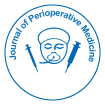
Journal of Perioperative Medicine
Open Access
ISSN: 2684-1290

ISSN: 2684-1290
Commentary - (2023)Volume 6, Issue 3
Perioperative medicine is a rapidly evolving field of medicine that focuses on optimizing patient care before, during, and after surgical procedures. One of the critical aspects of perioperative medicine is preoperative assessment. A thorough preoperative assessment is essential for identifying patient-specific risk factors, developing personalized care plans, and reducing the likelihood of postoperative complications.
Identifying patient-specific risk factors
Preoperative assessment involves a comprehensive evaluation of the patient's medical history, current medications, and any chronic medical conditions. Patients are evaluated for potential respiratory, cardiovascular, and metabolic risks that may require special attention during surgery.
By identifying patient-specific risk factors before surgery, healthcare providers can develop personalized care plans that address these risks and reduce the likelihood of complications during and after surgery. For example, patients with a history of heart disease may require additional monitoring during surgery to ensure that their cardiovascular system is functioning correctly.
Developing personalized care plans
Preoperative assessment is also critical for developing personalized care plans that are tailored to individual patient needs. These care plans may include adjustments to medication regimens, preoperative counseling, and lifestyle modifications.
For example, patients with chronic medical conditions such as diabetes may require adjustments to their medication regimen before surgery to ensure that their blood sugar levels are stable. Preoperative counseling may also be necessary to prepare patients for their surgery and help them understand what to expect during and after the procedure.
Reducing the likelihood of postoperative complications
Preoperative assessment can also help reduce the likelihood of postoperative complications. By identifying patient-specific risk factors before surgery, healthcare providers can take steps to mitigate these risks and improve patient outcomes.
For example, patients with a history of respiratory problems may require additional monitoring during and after surgery to ensure that their breathing is stable. Patients with a history of blood clots may require prophylactic treatment to reduce the risk of developing postoperative deep vein thrombosis.
Preoperative assessment in older adults
Preoperative assessment is particularly important for older adults. As we age, our bodies become more susceptible to the risks associated with surgery. Older adults may have multiple chronic medical conditions, which can increase the risk of postoperative complications.
Preoperative assessment in older adults may include a more comprehensive evaluation of cognitive function, as well as an assessment of functional status. Older adults may require additional support after surgery, such as physical therapy or home health care services.
In addition, preoperative assessment can help identify geriatric syndromes, such as delirium or frailty, which can increase the risk of postoperative complications. By identifying these syndromes before surgery, healthcare providers can take steps to mitigate these risks and improve patient outcomes.
Preoperative assessment is a critical aspect of perioperative medicine that plays a significant role in optimizing patient care before, during, and after surgical procedures. By identifying patient-specific risk factors, developing personalized care plans, and reducing the likelihood of postoperative complications, preoperative assessment can help improve patient outcomes and enhance the recovery process.
In addition, preoperative assessment is particularly important for older adults, who may have multiple chronic medical conditions and may require additional support after surgery. By taking a comprehensive approach to preoperative assessment, healthcare providers can ensure that patients receive the care they need to achieve the best possible outcomes after surgery.
Citation: Bignam E (2023) The Importance of Preoperative Assessment in Perioperative Medicine. J Perioper Med. 6:168.
Received: 01-May-2023, Manuscript No. JPME-23-24133; Editor assigned: 03-May-2023, Pre QC No. JPME-23-24133 (PQ); Reviewed: 17-May-2023, QC No. JPME-23-24133; Revised: 24-May-2023, Manuscript No. JPME-23-24133 (R); Published: 31-May-2023 , DOI: 10.35248/2684-1290.23.6.168
Copyright: © 2023 Bignam E. This is an open-access article distributed under the terms of the Creative Commons Attribution License, which permits unrestricted use, distribution, and reproduction in any medium, provided the original author and source are credited.